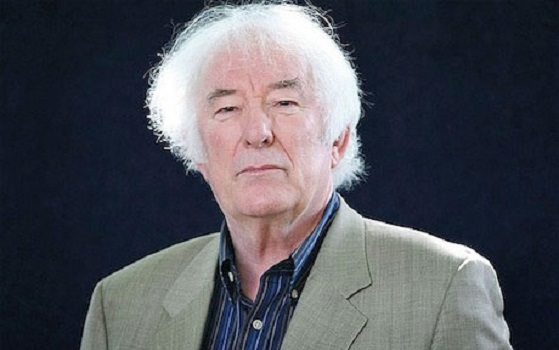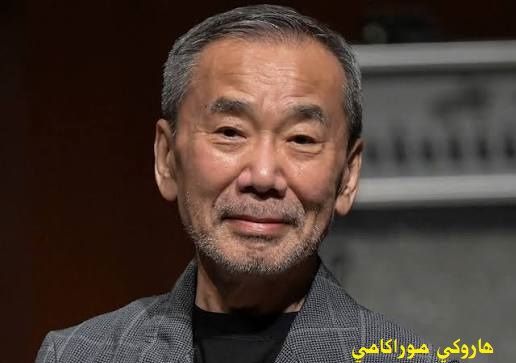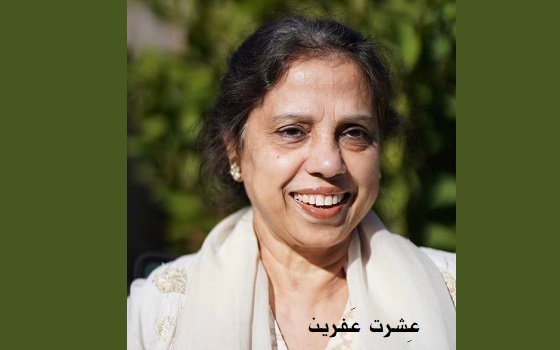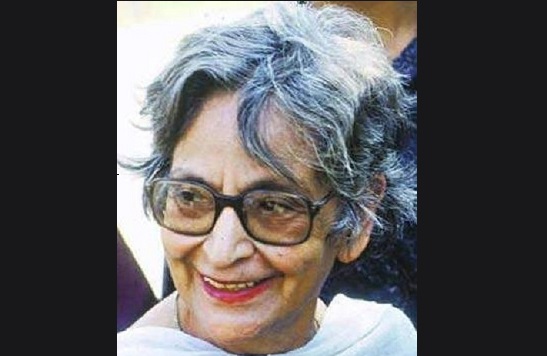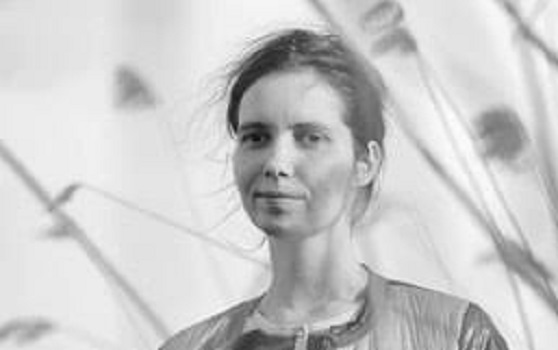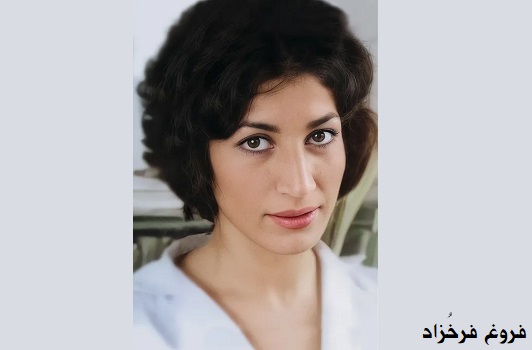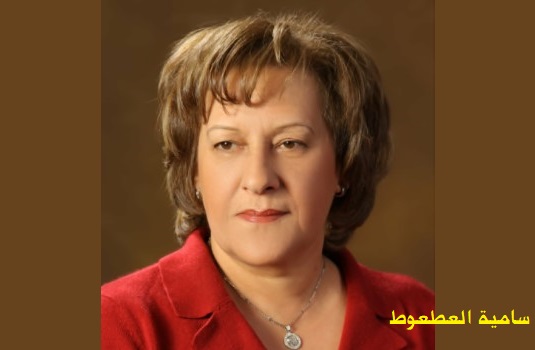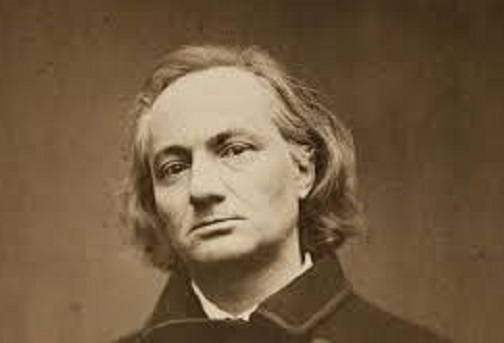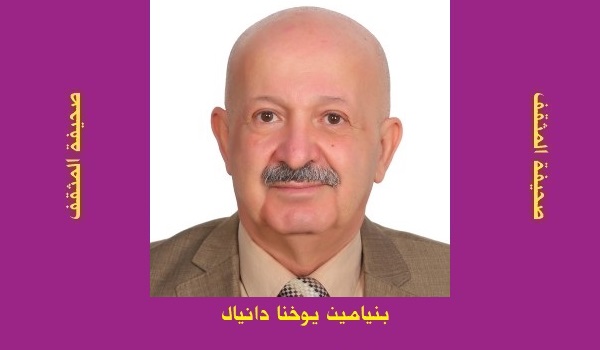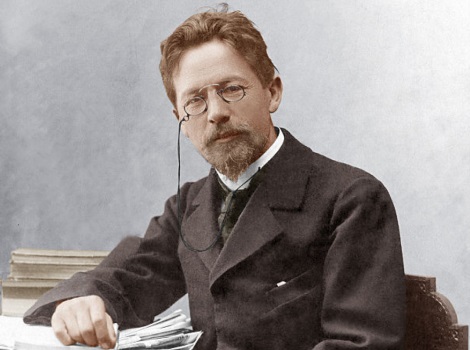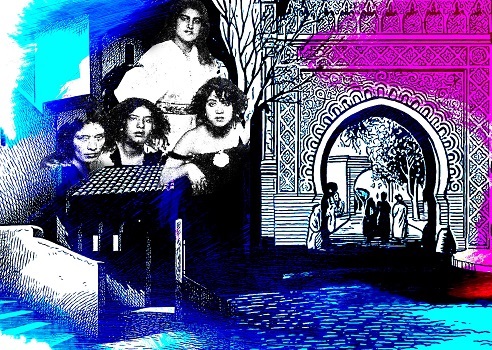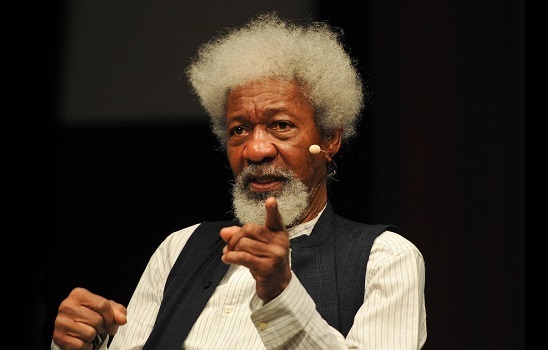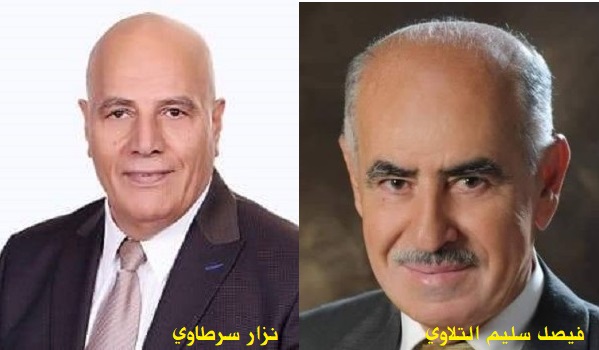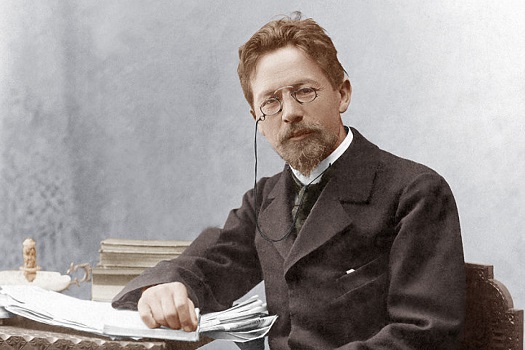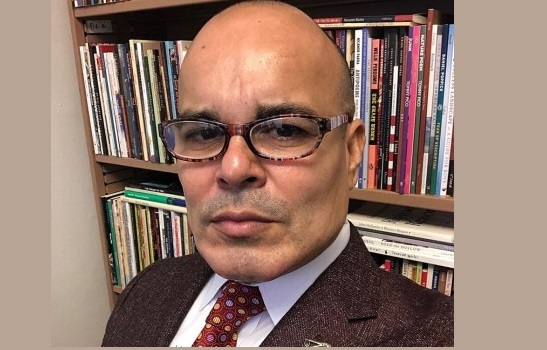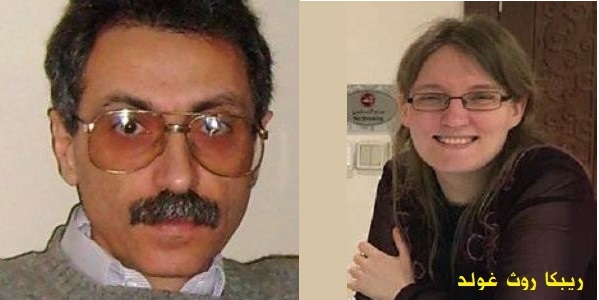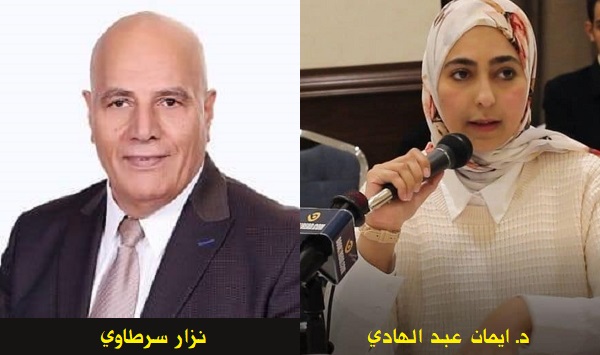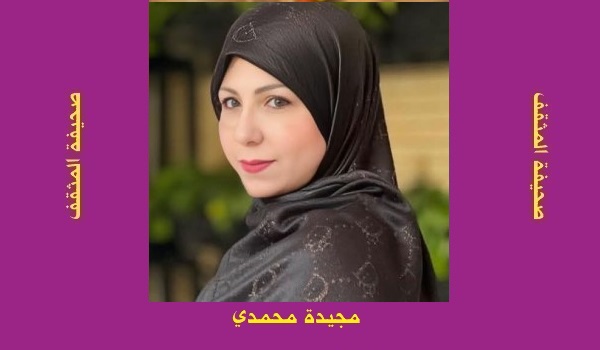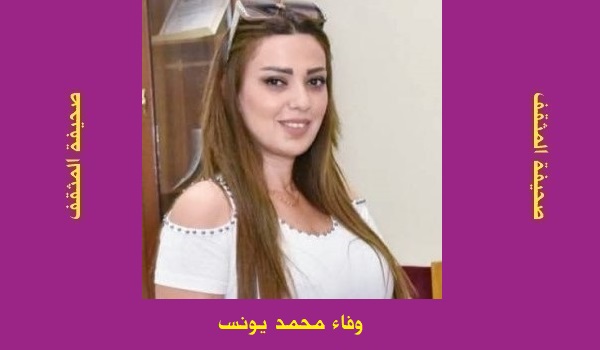قصة: بانو مشتاق
ترجمة: د. محمد عبد الحليم غنيم
***
ما إن دفعت مهرون الباب شبه المغلق، بالكاد وضعت قدمها داخلة المنزل ، حتى توقف والدها، الممدّد على السرير الحديدي في غرفة الاستقبال، وأخوها الأكبر، الذي كان يناقشه بصوت منخفض، عن الحديث ونظرا إليها. وفجأة اندفعت نحوها ابنة أخيها، رابعة، من الداخل وهي تهتف: «جاءت فوفو مهرون! جاءت فوفو مهرون!» في تلك اللحظة خرج أمان، أخوها الثاني ووالد رابعة، من غرفته، ورغوة صابون الحلاقة تغطي ذقنه، والفرشاة لا تزال بيده، ووقف في غرفة الاستقبال ينظر إليها كما لو أنه لا يصدق عينيه. أما أثيجة، أختها الكبرى، التي كانت تُعلّم الأولاد القرآن بصوت غنائي، فقد خرجت إلى غرفة الاستقبال تحدّق بها، غير منتبهة إلى الـ سيراغو، طرف الساري المنسدل عن رأسها. ووالدتها، التي كانت تمسك بحبات المسبحة في يديها النحيلتين، وقفت مذهولة، وكأنما تسأل: «أحقًا ما أراه؟ أهذا حقيقي؟» أما شقيقتاها الأصغر، ريحانة وصبيحة، فكانتا تطلان من خلف باب غرفة الاستقبال، غير مباليتين بأن الأرغفة التي كانتا تخبزانها في المطبخ بدأت تحترق على الـ طاوة. ولحسن الحظ، لم يكن أخوها الأصغر، عاطف، في المنزل.
تجمّد البيت كله فى لحظة. بدا لها غريبًا. الأم التي حملتها في بطنها تسعة أشهر وربّتها لم تقل: «ها قد جئتِ، تعالي يا عزيزتي»، والأب الذي كان يفرح بالطفلة التي كانت تقفز على صدره العريض لم يرسم على وجهه حتى ابتسامة ترحيب بسيطة؛ لا أخوها الأكبر، الذي كان يفخر بها ويسمّيها «ملاكي، حور عيني»، ولا أمان، الذي أصرّ على أن تدخل الجامعة، رحّبا بها. زوجات إخوتها كنّ يحدّقن بها كما لو كانت من كوكب آخر.
انقبض قلب مهرون. ولم يخرج الجميع من ذهولهم إلا حين أطلقت الطفلة ذات التسعة أشهر التي كانت بين ذراعيها صرخة حادة. سألها أخوها الأكبر:
«أين عناية؟»
نكست رأسها كما لو كانت قد اقترفت جريمة، وأجابت:
- ليس في المدينة.
- فمع من جئتِ إذًا؟
- جئتُ وحدي.
- وحدكِ؟
ارتفعت الأصوات من حولها كجوقة صادمة، فيما ظلت واقفة على العتبة.
قال أخوها الأكبر:
- فاروق، أدخلها.
وما إن صدر الأمر، حتى مشت مهرون بخطى ثقيلة ومضطربة. بدا لها المكان كقاعة محكمة. بدأت طفلتها في البكاء، فجلست على طرف سرير والدها دون أن تنزع البرقع، ورفعت النقاب، وأرضعتها. لم تكن قد غسلت وجهها. كانت معدتها تحترق من الجوع بينما الطفلة ترضع. لم تكن قد أكلت منذ الليلة الماضية. لم يُسمح لأي امرأة في ذلك اللقاء سوى والدتها.
- مِهر، هل أخبرتِ أحدًا في البيت قبل أن تأتي؟
- لا.
- لماذا؟ لماذا لم تُخبري أحدًا قبل أن تغادري؟ يبدو أنكِ عقدتِ العزم على أن تجلبي لنا العار.
- ومن كنتُ سأُخبر؟ من هناك أصلًا؟ لقد مرّ أسبوع منذ أن عاد آخر مرة إلى البيت — ولم يخبرني حتى إلى أين ذهب. كتبتُ إليكم جميعًا، لكنكم لم تردّوا، ولم تهتموا إن كنتُ حية أو ميتة.
- كتبتِ أن زوجكِ ذهب مع إحدى الممرضات. وتتوقعين منا أن نصدق ذلك؟
- إذا كنتم لا تصدقونني، كان عليكم المجيء والتحقق بنفسكم. هناك من رآهما معًا.
- وماذا سنفعل بعد أن نراه؟ لنفرض أننا أمسكنا به وسألناه، فأجاب بنعم، هذا صحيح - ماذا سنستطيع فعله حينها؟ أنقدّم شكوى للمسجد؟ سيقول: لقد أخطأت، وسأجعلها مسلمة وأتزوجها. عندها ستكون زوجة شرعية لكِ. ولنفرض أننا وبخناه أكثر، ماذا سنفعل إذا قال: لا أريد هذه المرأة مهرون، سأطلقها؟
بحلول هذا الوقت، كانت مهرون تبكي بلا توقف. نقلت رضيعها إلى ثديها الآخر وهي تواصل إرضاعه، وسحبت طرف ساريها من تحت برقعها ومسحت عينيها وأنفها. ساد صمت للحظة.
- إذن أنتم جميعًا غير قادرين على فعل أي شيء، أليس كذلك؟"
لم يتحدث أحد. واصلت:
- سجدت عند أقدامكم، وقلت أني لا أريد الزواج. هل استمعتم لي؟ قلتُ سأرتدي البرقع وأذهب إلى الجامعة. توسلتُ إليكم ألا تجبروني على ترك الدراسة. لم يصغِ أحدٌ منكم. كثير من زميلاتي في الصف لم يتزوجن بعد، بينما أنا أصبحت عجوزًا. لدي عبء خمسة أطفال. أبوهما يتجول في الخارج، وأنا لا أملك حياة. عندما يفعل الرجل شيئًا حرامًا كهذا، أليس بينكم من يستطيع سؤاله لماذا يفعل هذا؟
- كفى يا مهر، كفى. أغلقت أمها عينيها وهزت رأسها.
- نعم أمي، لقد اكتفيتُ أيضًا. في البداية بدأ الناس يهمسون، ثم أولئك الذين رأوهما معًا في السينما ويدخلان الفنادق جاءوا وأخبروني مباشرة. ثم أصبح جريئًا بزيادة ليبدأ بزيارة منزلها. وبعد أن وبخه الجميع، ذهب إلى بنجالورو، وأنفق آلاف الروبيات، ونقلها. والآن يعيش معها منذ ثمانية أيام. إلى متى يمكنني تحمل هذا؟ كيف سأعيش؟
- تحلي بالصبر يا بنيتي. عليكِ أن تحاولي إعادته إلى الطريق الصحيح بالحب.
- أمي، أما أملك قلبًا؟ أما لدي مشاعر؟ لا أستطيع احترامه كزوج بعدما فعل هذا . يمتلئ جسدي بالقرف عندما أراه. حبه أصبح فكرة بعيدة جدًا. الأمر لا يتعلق به وهو يطلقني سأحصل على الطلاق منه. لن أعود إلى ذلك المنزل."
- مهر، ماذا تقولين؟ هذا كثير. هو رجل، وداس على بعض الوحل، لكنه سيغسله حيث يوجد الماء ثم يعود إلى الداخل. لا توجد وصمة ستلتصق به.
قبل أن تتمكن من الرد، قطع أمان حديثها:
- انظروا كيف تتصرف أمامنا. لا بد أنها تحدثت بهذه الطريقة أمامه أيضًا. ولهذا لا بد أنه غضب وتركها
ثم خفف نبرته:
- إذا تعلمت بنات هذا البيت مثل هذه الأشياء، سيكون ذلك رائعًا، أليس كذلك؟
تحول حزن مهرون بسرعة إلى غضب ثم خيبة أمل.
- تجادل بشكل جيد يا أخي. ربما يحفظك الله. صحيح: أنا الشخص السيء. لقد عرفت طبيعتي السيئة. لم أخرج دون برقع. هو أمرني بالتخلص منه، وارتداء الساري تحت سرتي والتمايل وأنا أمسك بيده. لكنكم غطيتوني ببرقع وربيتوني حتى أني لا أسمح لطرف ساري أن ينزلق عن رأسي، أليس كذلك؟ أشعر بالعار إذا خلعته الآن. ملأتموني بخوف الله. لم أوافق على فعل ما طلبه مني، لذا ذهب مع من يرقص على إيقاعه. والآن أنتم جميعًا خائفون من أن أصبح عبئًا عليكم إذا تركني - لهذا تقولون لي أن أتحمل. لكن هذا لم يعد ممكنًا الآن. بدلًا من الاحتراق في ذلك الجحيم الحي، سآخذ أطفالي وأعمل كحمالة في مكان ما. لن أكون عبئًا عليكم - ليس عبئًا على الإطلاق.
اعترضت أمها.
- هل الثمرة عبء على المتسلقة يا مهر؟ لا تقولي هراءً."
قال أخوها الأكبر بجدية:
- أمي، خذيها إلى الداخل وأعطيها شيئًا لتأكله. سنغادر إلى شيكماغالور في عشر دقائق. إذا كانت هناك حافلة، سنأخذها. وإلا سنستأجر تاكسي. لا يمكننا الرقص على إيقاعها أيضًا.
- لن أشرب قطرة ماء في منزلكم. ولن أذهب إلى شيكماغالور. إذا أخذتموني هناك بالقوة، أعدكمكم أني سأحرق نفسي.
- هذا كثير جدًا يا مهر. من يريد الموت لا يتجول ويتحدث عنه. لكن إذا كنتِ تهتمين بشرف هذه العائلة، لكنتِ فعلتِ ذلك بدلًا من المجيء إلى هنا. المنزل الذي تذهبين إليه بملابس الزفاف يجب أن يكون المنزل الذي تخرجين منه بملابس الحداد. هذه هي حياة المرأة المحترمة. لديكِ ابنة تدرس في المدرسة الثانوية؛ لديكِ أختان صغيرتان في سن الزواج. خطوة واحدة خاطئة وستعيقين مستقبلهن. تقولين أننا يجب أن نستمع إلى كلماتك الطفولية، ونذهب ونتشاجر مع زوجك، لكن لدينا أيضًا زوجات وأطفال. لذا اذهبي إلى الداخل وكلي شيئًا.
التفت إلى أخيه للحظة، ثم عاد ليواجهها:
- أمان، أسرع واستأجر تاكسي. وأنتِ يا مهر، إذا سألكِ أطفالكِ أو الجيران، قولي لهم أنكِ أخذتِ الرضيع إلى المستشفى، أو شيء من هذا القبيل. في أي وقت غادرتِ إلى هنا؟
لم تنطق بكلمة.
قال أمان:
- الساعة الآن التاسعة والنصف. لقد وصلت عند التاسعة تمامًا. الرحلة تستغرق ثلاث ساعات. لا بد أنها غادرت في السادسة صباحًا. إذا خرجنا حالًا، يمكننا الوصول هناك في الثانية عشرة والنصف.
لم تتحرك مهرون من مكانها. كانت أمها وشقيقتاها الصغيرتان تتناوبان في الرجاء والتوسل إليها كي تأكل، لكنها لم تدخل فمها لا لقمة طعام ولا قطرة ماء. وعندما جاءت سيارة الأجرة، لم تتحدث إلى أحد. خرجت وهي تحتضن طفلتها بقوة إلى صدرها، وإخوتها الكبار إلى جانبها، دون أن تودّع أحدًا. فقط حين نزلت الدرجات الأخيرة، التفتت لتنظر إلى البيت الذي وُلدت فيه وترعرعت. امتلأت عيناها بالدموع. كان والدها يمسك صدره ويسعل. ووالدتها تبكي، تتلفّت بين ابنتها وزوجها، تحاول أن تجعله يستلقي، تروّحه، ترشّ الماء عليه، وتردّد لنفسها: "يا رب، إن كان لي أي ثواب، أي فضل، أي حسنة في حياتي، فلتُصلح لي حال ابنتي."
فتح أمان باب السيارة، مشيرًا بعينيه إلى مهر كي تركب، وهو يتمتم متذمرًا. كانت، أحيانًا، تتفاخر بإخوتها الكبار. حين كانت تغضب من زوجها عنایت، كانت تقول له: «إخوتي واقفون كالأسود، وإذا استمريت في تصرفاتك هذه، سيقطعونك يومًا إربًا ويرمونك، فاهم؟» لكن هذا الفخر تلاشى تمامًا. كانت كلمات إخوتها ترنّ في أذنيها:
- لو كان عندك ذرة عقل لحفظ كرامتنا، لكنت أحرقتِ نفسك ومتِّ. لم يكن يجب أن تأتي إلى هنا.
لم تلتفت إلى بيتها وهي تصعد السيارة — لا إلى أمها التي كانت ستراها تطل من نافذة، ولا إلى شقيقاتها اللواتي يتلصصن من خلف الستارة، ولا إلى زوجات إخوتها اللواتي كنّ مشغولات في أعمالهنّ المنزلية على الأرجح. لكن دموعها انهمرت بغزارة من تحت نقابها. جلست تعضّ على شفتيها وتبتلع شهقات صغيرة.
كانت السيارة تسير بسرعة. لم يتكلم أحد. أمان كان جالسًا في المقعد الأمامي بجوار السائق من الحارة. وهل يمكن مناقشة أسرار العائلة أمامه؟
استمرّت الرحلة في صمت. لقد كانت مهرون مجرد نرد في لعبة عنایت من الحب والشهوة طوال ستة عشر عامًا. وبعد ستة عشر عامًا، أهان أنوثتها. قال لها بازدراء:
- تتمدّدين كأنكِ جثة. أي سعادة وجدتها معكِ؟
ثم أضاف:
- ماذا ينقصك؟ قدّمت لكِ كل شيء — من الملبس إلى المأكل. من يمنعني الآن؟ أنا مع امرأة تسعدني.
لم تلحظ الأشجار ولا المشاهد ولا الطريق. ولمّا توقّفت السيارة فجأة، ونظرت إلى الخارج بلامبالاة، رأت المنزل الذي قيل لها إنه بيتها. جاءت فتاة صغيرة، وجهها ذابل، تركض من الباب الأمامي وهي تهتف:
- أمي! أخيرًا عدتِ. كنتُ قلقة جدًا!
أخذت الطفلة من بين يدي أمها، وضمتها إلى صدرها وركضت إلى الداخل.
دخلت مهرون البيت بخطى بطيئة. كان البيت خاليًا. بقية الأولاد كانوا في المدرسة، وابنتها الكبرى، سلمى، البالغة من العمر ستة عشر عامًا، والتي كانت تتقاسم مع أمها ألمها، كانت وحدها في البيت ذلك اليوم. كانت سلمى قد أرسلت إخوتها إلى مدارسهم، تنتظر بقلق عودة أمها. وعندما رأت أخوالها برفقة أمها، تنفست الصعداء. فرحت برؤيتهم. ظنت أن أخوالها سيجرّون تلك المرأة الأخرى من شعرها ويطردونها. صارت تجري كالغزالة، تُحضر لأخوالها بعض السكاكر، وتُغلي الشاي.
كانت مهرون مستلقية في غرفتها. دخلت سلمى، مسحت دموع أمها، وأطعمتها بضع لقمات، وكانت تهم بالخروج حاملة صحن الطعام المتبقي، حين سمعت صوتًا مألوفًا. ركضت عائدة إلى غرفة النوم.
- أمي، أمي، أبي جاء!
تظاهرت مهرون بأنها لم تسمع، وغاصت أعمق تحت الغطاء الذي كانت قد تغطّت به. كانت أعصاب رأسها تخفق من شدة التوتر، بينما خرجت سلمى إلى غرفة المعيشة. كان أخوالها قد خرجوا مجددًا، وكانت تسمع أصوات الرجال يتحدثون. حديث، ضحك، سلامات.
"آريه بهيا! في أي وقت جئت؟" كان عنايت يسأل.
"جئنا للتو. كيف حالك؟"
"أنا بخير، بفضل الله ودعواتكم."
صوت أمان: "أين كنت يا عنايت بهاي؟"
"هنا فقط. بعض الأعمال، أفعل هذا وذاك - تعرف كيف هو الحال. بعد كل شيء، لا يمكننا الجلوس في المنزل بعد الاستيقاظ. سلمى "
نادى على سلمى ابنته:
- سلمى، أين ماما؟ انظري من جاء. قولي لماما أن تخرج.
لم يصدر أي صوت من داخل المنزل. قال:
- أتساءل أين هي. لا بد أنها بالداخل مع الرضيع. دعني أناديها، انتظروا.
دخل ورأى سلمى، وسألها بصوت منخفض:
- متى جاء هؤلاء؟ أين أمك؟
بدأ خيط من الشك يتشكل في قلبه. أجابت سلمى بذكاء. خرجت منه زفرة راحة.
- جاء الأخوال للتو. أمي لا تزال نائمة.
- لم تستيقظ بعد؟ ماذا حدث لها؟
جاء إلى باب غرفة النوم. منظر مهرون المتكورة نائمة أقلقه. ادعاؤها الوحيد للأهمية هو أنها أم أطفاله. رغم رغبته في ذلك، لم تحمله قدماه للداخل.
تخيلت كيف يقف عند الباب. ملابسه، رائحة السجائر، عرق جسده، جسده الذي يشيخ، عيناه الكبيرتان. الرجل الذي ترك أثره على كل عصب فيها أصبح غريباً عنها. بقيت ملفوفة بإحكام بالبطانية، تسمع صوته.
- سلمى، تعالي هنا. قولي لها أن تتوقف عن كل هذا الدراما. أنه إذا كانت قد استدعت إخوتها هنا ليعظوني، فهي تضع حبلاً حول عنقها. بنفس واحد - مرة، مرتين، ثلاث مرات - سأقولها وأنهي الأمر، قولي لها. وأخبريها أنه بعد طلاقها، لترى إذا كانت قادرة على تزويج أخواتها الصغيرات وبناتها. قولي لها هذا - أنها تدمر شرف العائلة أمام الضيوف. قولي لها، أمك. دعيها تحيي إخوتها - اسأليها إذا كانت تريد دجاجاً أم لحم ضأن، لأن الوقت يقترب من الظهر، لذا قولي لها أن تبدأ في طبخ الغداء قريباً."
لم تكن سلمى حتى هناك، لكنه أفرغ كل ما كان عليه قوله، متخيلاً أنها تسمعه.
تحدث عنايت وأصهاره كما لو أنه لم يكن هناك خطأ ما. تحدثوا عن أسعار القهوة، عن الانتخابات في كشمير، عن التحقيق في جريمة قتل زوجين مسنين في الحي، عن الفتاة المسلمة من المحلة التي تزوجت شاباً هندوسياً في حفل مدني، عن هذا الشيء، عن ذاك. استمر الحديث بينما صفرت طنجرة الضغط، ودوى صوت الخلاط، وانتشرت رائحة التوابل القوية، وأحضر الدجاج، وكان الطعام جاهزاً لأن مهرون هي من أعدته، وركضت سلمى تخدمهم جميعاً على الغداء.
خرجت مهرون من المطبخ مرة واحدة فقط، لفترة وجيزة.
بعد وجبة ثقيلة، وفمهم ممتلئ بقطع التنبول، استعد إخوة مهرون للمغادرة. قبل أن يذهبوا، جاء أمان ووقف قرب باب المطبخ.وقال لأخته:
- استخدمي القليل من الذكاء وتعاملي مع كل هذا، سآتي في زيارة الأسبوع المقبل. سيتصرف هكذا لبضعة أيام ثم سيعود من تلقاء نفسه. يجب أن تكوني مسؤولة. ما المشاكل التي تواجهها بعض النساء - أزواج مدمنون على الخمر، حماه يضربونهن. احمدي الله أنك في وضع جيد. هو غير مسؤول قليلاً، هذا كل شيء. عليكِ أن توازني كل ذلك.
غادر إخوتها، وبمجرد اختفاء صوت السيارة، طار عنايت إلى خارج المنزل أيضاً.
التفتت سلمى إلى أمها. لم يواسيها أخوالها ولم يساعدوها. بدأت تنتفض بحزن أمها. امتلأت عيناها بالدموع عندما خرج أبوها. كان المنزل محاطا بالكآبة، وعندما عاد إخوتها من المدرسة لم يتمكنوا من تبديدها. كان لكل منهم مهامه الخاصة، وعبئه الخاص.
عندما بدأ المساء يفقد نوره، أضيئت المصابيح حول المنزل. لكن المصباح في قلب مهرون كان قد انطفأ منذ زمن بعيد. من تعيش من أجله؟ ما المغزى؟ الجدران، السقف، الأطباق، الأوعية، الموقد، السرير، الأواني، نبتة الورد في الفناء الأمامي - لا شيء منها كان قادراً على إجابة أسئلتها. لم تلاحظ الزوج من العيون الباهتة التي تحوم حولها، تقف على أهبة الاستعداد. أرادت سلمى أن تدفن نفسها في كتبها؛ كان من المفترض أن تستعد لامتحانات الثانوية العامة المُقبلة. لكن قلقاً عظيماً لا يمكن وصفه جعلها تبقى أمها في مرمى بصرها باستمرار.
في هدوء الليل، كانت مهرون تحدق في الظلمة. كانت ليلة حالكة السواد، مثل حياتها تمامًا.كان الأطفال نائمين. وحدها سلمى لا تزال مستيقظة، تذاكر دروسها في غرفة الجلوس، وعيناها لا تفارقان غرفة أمها.
غابت عن مهرون القدرة على النوم. أخذت تتساءل:هل كانت معاركها في بيت أهلها أسهل؟ كان زواجها من عنايت قبل شهر من امتحانات السنة الثانية في تجارة. بكت، وتوسلت أن يُسمح لها بتقديمها، لكن الجميع كانوا صمًّا عن توسلاتها.بعد أسبوع تقريبًا من الزواج، تحدّثت مع زوجها بخجل عن الأمر.ضحك، وراح يناديها: " حبيبتي ، قلبي ، روحي".قال:
- إذا لم تكوني هنا، ألا أختنق؟
وصدّقته مهرون. صدّقت أنه إن لم تكن معه، ربما يختنق فعلًا.كانت سعيدة. أطاعت كل رغباته، وكانت هي المصباح الذي أضاء قلبه.
لم تحصل مهرون على زوجها لنفسها إلا بعد وفاة والديْه قبل عام.ذهبت أخوات زوجها إلى بيوت أزواجهن، وذهب أصهارها كل في طريقه . تحقق الحلم القديم — أن يكون لها بيتها الخاص. لكن حين تحقق، كانت ملامحها قد تغيرت. تجعد وجهها، وبرزت عروق يديها، واستقر ظل رقيق تحت عينيها، وتشقق كعباها، واستقر الوسخ تحت أظافرها المتكسرة غير المتساوية، وخف شعر رأسها — ولم تكن قد انتبهت لأيٍّ من ذلك.
وكل هذا لم تلاحظه هي ، وربما لم يكن عنايت ليلحظ أيضًا، لولا عملية الزائدة التي أجراها... وتلك الممرضة... تلك الممرضة التي تعمل كثيراً مقابل أجر زهيد في مستشفى خاص،بألف حلم في عينيها، تمشي أو ربما تطير في الهواء - يصعب الجزم - ببشرتها المتوهجة وعينيها العسليتين اللتين تجذبانك مثل الدوامة، وهي تنزلق نحو الثلاثينيات من عمرها، مستعدة لفعل أي شيء، أي شيء على الإطلاق، لضمان مستقبلها وإشباع أحلامها.
لم ينادِ عنايتُ تلك الممرضةَ بـ«أخت» كما جرت العادة. منذ اليوم الأول الذي قضاه في المستشفى، كان يناديها باسمها مباشرة. ثم راح يُهين الرحم الذي منحه أولاده وبناته.راح ينتقد بطن مهرون المرتخية، وثدييها المترهلين اللذين أرضعا أطفالهما حتى الشبع. لقد جعل روحها تشعر بالعار أيضاً. ذات يوم قال لها:
-أنتِ مثل أمي .
وبهذه الكلمات دفعها حية إلى الجحيم. في الأشهر القليلة منذ أن نطق بهذه الكلمات،
كل لقمة تأكلها في هذا البيت تشعر بها كإثم. شعور الغربة في بيتها يؤرقها، ونار الإهانات تطحنها،لذلك لجأت إلى عائلتها طلباً للمساعدة.
كانت عتمة الليل تزداد كثافة، وكان القلق في قلب مهرون يتصلّب ويتجذّر.لم يسبق لها أن شعرت بهذه الوحدة من قبل . لم يكن لديها أي رغبة في شيء. جلست على السرير. لا أحد يسأل عنها. لا أحد يغازلها، لا أحد يعانقها، لا أحد يقبلها. الشخص الذي كان يفعل هذه الأشياء أصبح ملكاً لغيرها الآن. لا يبدو أن للحياة نهاية.حتى الضجة الصاخبة من الخلف لم تزعجها. علمت أن صورة مؤطرة قد سقطت، وانكسر الزجاج،وتحطم الإطار إلى قطع، وسقطت الصورة لكن نوعًا من القلق العميق كان قد استوطن قلبها، ولم تكن لديها أي رغبة في ترتيب الفوضى. نهضت ببطء من السرير.حدقت في رضيعها لفترة طويلة، ثم خرجت من الغرفة. كان أطفالها الصغار ينامون بسلام.
بخطوات هادئة، دخلت إلى غرفة المعيشة ورأت سلمى التي كانت تستذكر دروسها هناك قد غلبها النعاس، ورأسها مستند إلى الطاولة. وقفت مهرون بجانب ابنتها النائمة،وبدأت ترتجف. كانت تظن أن مشاعرها قد ماتت جميعها، لكن ذلك الطوفان الذي اجتاحها وهي تنظر إلى سلمى جعلها توشك أن تنهار. قاومت رغبة جارفة في أن تلمس ابنتها، وقالت لها، في قلبها: "يجب أن تكوني أمًّا لهؤلاء الأطفال، يا عزيزتي".
بدأت قدماها تحملانها ببطء إلى الأمام. فتحت الباب وخرجت إلى الفناء الأمامي. النباتات القليلة التي كانت قد رعتها بدت كأنها تبكي. وكأنها تومئ موافقةً على القرار الذي اتخذته. عادت إلى الداخل، أغلقت الباب خلفها، وتوجهت إلى المطبخ، حملت علبة الكيروسين ودارت حول المنزل، غير قادرة على تحديد المكان الذي يجب أن تكون فيه عندما تُريق الكيروسين على نفسها. توقفت لتلقي نظرة أخيرة على أطفالها النائمين قبل أن تعود إلى غرفة الجلوس.
لم تنظر إلى سلمى.
سارعت إلى المطبخ، التقطت علبة الثقاب، وبيدها اليمنى تمسك بها بإحكام، فتحت مزلاج الباب الأمامي بهدوء وخرجت إلى الفناء مرة أخرى. حدقت في الظلام وتأكدت من أنها تفكر في أنها لا تملك أحداً، في أن لا أحد يريدها، بينما كانت تُريق الكيروسين على نفسها. كانت في قبضة قوة خارجة عن سيطرتها. نظرت حولها، ولم تصل إلى مسامعها أي أصوات، ولم تستطع أن تشعر بأي لمسة، لم يتبقَّ لها أي ذكريات، ولا علاقات تستطيع اختراقها. كانت خارج وعيها.
لكن كل شيء كان يحدث داخل المنزل، حيث أيقظ صرخات الطفل الجائعة سلمى فجأة، مما جعلها تسرع لتحمل الطفل إلى صدرها وتنادي "أمي، أمي"، تعبر الغرفة إلى حيث كان إخوتها نائمين ثم تبحث عن أمها في أنحاء المنزل، قبل أن تلاحظ الباب المفتوح وتخرج مسرعة إلى الفناء، وحتى في ذلك الظلام الضبابي، رأت شكل أمها وشمَّت رائحة الكيروسين.
بدون تفكير، أسرعت إلى الأمام وهي تحمل الطفل بين يديها وعانقت أمها بشدة. نظرت أمها، التي كانت تحمل علبة الثقاب في يدها، إلى الفتاة التي تعانقها بلا شعور، وكأنها كانت تنتظر شخصاً آخر. وضعت سلمى الطفل على الأرض وبكت: "أمي! أمي! لا تتركينا وتذهبي!" وأمسكت بساقي أمها.
كانت سلمى تنتحب، والرضيع الصغير يبكي على الأرض. نظرت مهرون إليهما، وحاربت لتتحرر من تلك القوة الغريبة التي أحاطت بها، فسقطت علبة الثقاب من يدها. ما زالت سلمى تشبثت بساقي أمها، وهي تردد:
- أمي... فقط لأنكِ خسرتِ شخصاً واحداً، ستلقي بنا جميعاً لرحمة تلك المرأة؟ أنتِ مستعدةٌ للموت من أجل أبي، لكن أليس بمقدوركِ أن تعيشي من أجلنا؟ كيف تجعليننا أيتاماً يا أمي؟ نحنُ فى حاجة إليك .
لكن أكثر من كلماتها، كان لمسة سلمى هي ما أثر فيها.
رفعت الطفل الباكي وضمت سلمى إلى صدرها، وبينما شعرت وكأن صديقةً تواسيها وتفهمها، ثقلت جفون مهرون، ولم تستطع إلا أن تهمس:
- سامحيني يا حبيبتي...
بينما كان ظلام الليل يبدأ في الذوبان.
(تمت)
***
............................
الكاتبة: بانو مشتاق/ Banu Mushtaq (ولدت في 3 أبريل 1948) كاتبة وناشطة ومحامية هندية تكتب باللغة الكانادية، وتنحدر من ولاية كارناتاكا. تُعرف بشكل خاص بكتابها "مصباح القلب"، وهو مجموعة من قصصها القصيرة تُرجمت إلى الإنجليزية بواسطة ديبا بهاشتي، وفاز بجائزة البوكر الدولية عام 2025. نشرت ست مجموعات قصصية، ورواية، ومجموعة مقالات، ومجموعة شعرية. وقد تُرجمت أعمالها إلى الأردية والهندية والتاميلية والمالايالامية والإنجليزية. وُلدت بانو مشتاق في أسرة مسلمة بمدينة حسن، كارناتاكا، في 3 أبريل 1948. وعندما كانت في الثامنة من عمرها، التحقت بمدرسة تبشيرية تدرّس باللغة الكانادية في مدينة شيفاموغا، بشرط أن تتعلم "القراءة والكتابة بالكانادية خلال ستة أشهر"؛ لكنها فاقت التوقعات وبدأت الكتابة بعد أيام قليلة فقط من التحاقها بالمدرسة.
* مصباح القلب: قصص مختارة هي مجموعة قصصية للكاتبة الهندية بانو مشتاق، كُتبت في الأصل باللغة الكانادية بين عامي 1990 و2023، وتُرجمت إلى الإنجليزية بواسطة ديبا بهاشتي. نُشرت المجموعة في المملكة المتحدة عن دار And Other Stories في 10 سبتمبر 2024، وتضم 12 قصة تستكشف حياة النساء المسلمات في جنوب الهند، مع التركيز على موضوعات مثل النظام الأبوي، وعدم المساواة بين الجنسين، والقدرة على الصمود.
فاز الكتاب بجائزة البوكر الدولية لعام 2025، ليصبح أول عمل مكتوب باللغة الكانادية وأول مجموعة قصصية على الإطلاق تفوز بهذه الجائزة.
